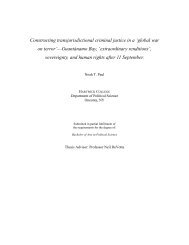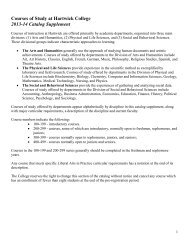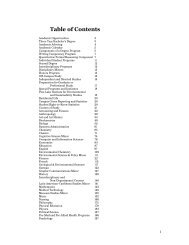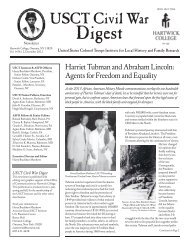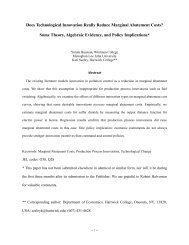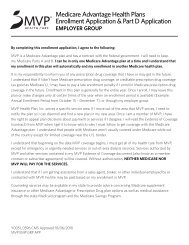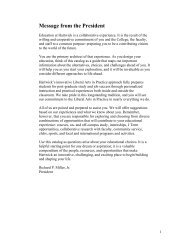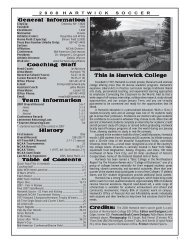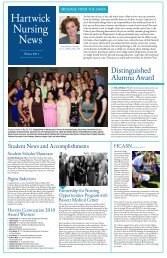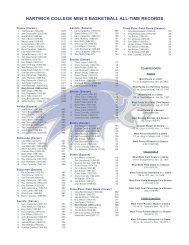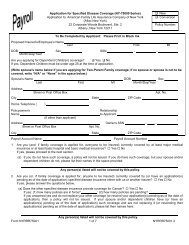Table of Contents - Hartwick College
Table of Contents - Hartwick College
Table of Contents - Hartwick College
You also want an ePaper? Increase the reach of your titles
YUMPU automatically turns print PDFs into web optimized ePapers that Google loves.
Cognitive Science Minor<br />
There has always been a fascination with how the mind works. How are<br />
information and knowledge represented in the mind? What is the nature<br />
<strong>of</strong> intelligence? How do we acquire and use language? How do we learn<br />
and reason? Can we build robots that perceive, solve problems, and make<br />
decisions like humans? How do brain lesions affect cognition? How is the<br />
human brain different from the brain <strong>of</strong> other animals? Questions such as<br />
these drive the field <strong>of</strong> cognitive science. In recent decades, researchers<br />
from a variety <strong>of</strong> disciplines have joined forces to tackle these topics,<br />
acknowledging the limitations <strong>of</strong> each discipline in isolation, and<br />
recognizing the value in interdisciplinary contributions. The five primary<br />
contributing disciplines in the study <strong>of</strong> cognitive science include:<br />
Cognitive Psychology Cognitive psychologists use controlled<br />
experimental research to study human mental processes. They contribute<br />
to the field <strong>of</strong> cognitive science by developing formal theories and<br />
sophisticated models <strong>of</strong> human cognition in areas such as perception,<br />
concept formation, attention, language understanding, memory, problem<br />
solving, decision making, reasoning, intelligence, etc. They <strong>of</strong>ten test and<br />
modify these theories by means <strong>of</strong> computer simulations, comparing the<br />
“minds” <strong>of</strong> humans and machines. Neurological evidence also provides<br />
important contributions to their theory and model development; for<br />
example, one popular model <strong>of</strong> the mind is analogous to neurons firing in<br />
the brain.<br />
Computer Science Computer science fits into the cognitive science field<br />
in a unique way. It provides a mechanism to test alternative theories <strong>of</strong><br />
how intelligence works through experimentation. Researchers can build<br />
computer models based on theories provided from psychology,<br />
philosophy, biology, linguistics, and other disciplines to see how they<br />
work.<br />
Linguistics Each time we utter a phrase, we are performing a complex<br />
operation that sets us apart from other living beings. Linguists study the<br />
ways in which human beings acquire language; the structure <strong>of</strong> words and<br />
sentences; the levels <strong>of</strong> meaning within language; and language’s effect on<br />
human relationships. Linguists also examine language to understand how<br />
a particular people organize reality and their surroundings, and how they<br />
create meaning and culture.<br />
Neuroscience Neuroscience is the study <strong>of</strong> the organization and<br />
function <strong>of</strong> the nervous system. Study can be undertaken at the molecular,<br />
cellular, systems, behavioral, and cognitive levels. Molecular neuroscience<br />
examines molecules and the roles they play in nervous system function.<br />
The study <strong>of</strong> how molecules work together to give the neuron and<br />
associated cells their special properties is cellular neuroscience. Systems<br />
neuroscience examines the way cells are organized into functional circuits<br />
that process information and mediate behavior. The manner in which<br />
cells and neural systems work together to produce integrated behavior is<br />
behavioral neuroscience. Understanding the neural mechanisms<br />
responsible for the higher levels <strong>of</strong> mental activity, such as memory,<br />
82



